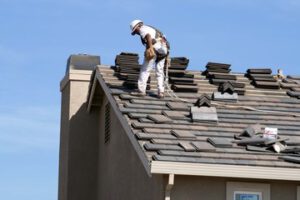How to Write a Roofing Contractor Job Description
Roofing Company Colorado Springs work to repair or replace roofs. They also work on home siding and windows. They must be able to draft contracts that comply with roofing law.
They typically require a deposit when starting a project and then receive payments throughout the job. A roofing contractor should be able to provide client references and a list of past projects. Contact these clients to find out whether they were satisfied with the finished project.
The job duties section of a roofer’s job description plays an important role in successfully attracting qualified candidates and deterring unqualified applications and resumes. Write a well-formatted job responsibilities section using dynamic action verbs, such as install, perform, and manage, to entice jobseekers to imagine themselves in the position. It’s also a good idea to provide some specific details of the day-to-day work activities that accompany the job to help applicants make an informed decision about whether or not it is a suitable opportunity.
The primary responsibilities of a roofing contractor involve building and installing weatherproof roofs using materials such as shingles and asphalt. Other duties include carrying out inspections of roofs to determine the cause of any problems and determining the best repair procedures to apply. They can also be responsible for removing existing roofs, insulating the underside of roofs, and replacing lead sheeting and cladding on structures such as skylight windows.
Roofing contractors are able to take control of all aspects of the re-roofing process and know exactly what materials are required to complete each step of the work. They can accurately estimate labor costs, supply their clients with quotes, and deliver the finished product on time and within budget. They’re also able to safely set up ladders, scaffolding, and other equipment, account for all materials used in the project, and dispose of any discarded materials.
Education and training requirements
There are no specific educational requirements to become a roofer, but it is helpful for anyone interested in this career to have some type of construction experience. Many roofers start out as apprentices, working under experienced workers to learn the skills of the trade. These apprenticeship programs may be offered through local colleges, vocational schools, or private construction companies. Obtaining an associate’s degree in construction management or a related subject is also a good idea for people who want to enter this career.
Some states have licensing, certification, or registration requirements for roofers. These may include passing an exam, taking a course, or having on-the-job training. Having industry certification can also make you more appealing to potential clients.
For example, in Alaska, roofing contractors are required to have a state license for residential work valued at more than $15,000 and a commercial license for projects of $50,000 or more. The license is issued by the Department of Licensing and Regulatory Affairs.
Having a state license is not required to work in Wyoming, but roofers must have a local license to do business there. Additionally, they must take a 5-day asbestos abatement course from the EPA before they can begin any roofing work. The EPA course covers safety procedures, regulations, and standards for removing and disposing of asbestos.
Experience and qualifications
A roofing contractor should have ample experience installing various types of shingles and other roofing materials. He should be adept at measuring and cutting roof materials, as well as ensuring that roofing materials fit securely around vents, gutters, and chimneys. He should also be able to repair leaky roofs, replace areas of damaged shingles, and create a waterproof seal using vapor barriers and insulation.
Depending on local requirements, a roofing contractor may need to register as a home improvement contractor or have other state- or city-specific licensing qualifications. Roofing contractors who own their own businesses should be proficient at marketing and advertising so they can attract leads. In addition, roofing contractors should be able to handle various aspects of construction, including building permits and inspections.
Typically, a roofing contractor will collaborate with a team of other specialized professionals throughout the course of a project. Therefore, he should be comfortable working as part of a group and be able to provide clear instructions to his employees. He should also be able to handle any customer service issues that arise during the course of a job. Lastly, he should be able to work on ladders and scaffolding for long periods of time as well as lift heavy materials. In addition, roofing contractors should be bonded and insured in order to ensure the safety of themselves and others on the job site.
Licenses and certifications
Aside from the necessary coursework and training, becoming a roofer requires certain licenses and certifications at the state level. Depending on your jurisdiction, there may also be local requirements at the city or town level. You must be able to show proof of insurance and pass the trade, business, and law exams to qualify for a roofing contractor’s license.
In the state of Arkansas, a roofing contractor license is required for commercial work worth over $2,000 and residential home improvement projects worth more than $10,000. You must pass a trade exam, a business exam, and a law exam and provide proof of workers’ compensation and general liability insurance to qualify for the licensing process.
Roofing contractors in the state of Michigan must obtain a contractor’s license to perform any type of construction work, including roofing. You must pass a trade exam, pass a background check, and provide proof of insurance and workers’ compensation to qualify for the licensing process.
Obtaining CRSI certification is one of the best ways to demonstrate your knowledge and expertise in the industry. It can also make you more appealing to potential customers. Other certifications that you can pursue include Owens Corning Preferred Contractor Certification and the National Roofing Contractor Association (NRCA) Contractor Certification. All of these certifications require an extensive amount of education, hands-on experience, and a rigorous examination process. Moreover, they cost an additional fee to obtain.
Payment Schedule and Deposit Requirements
A reputable roofing contractor should never ask for full payment upfront, especially for a large project. Those who do are likely to be scammers, either storm chasers or those who simply don’t want to take the time to do their work well.
Instead, most roofers will ask for a deposit or progress payments throughout the project, which can be stipulated in a contract. This strikes a balance between the builder’s need to get paid for materials purchased and work completed and the homeowner’s desire to only pay for what is done correctly.
If the roofer doesn’t receive a complete payment on time, it could result in a lien being filed against the property. This is an unfortunate fact because there are many legitimate contractors who do excellent work and rely on the security of a timely payment to keep their business going.
To help prevent this from happening, homeowners can take a number of precautions when hiring a roofer, including checking online reviews and requesting insurance verification (COI), a copy of the roofing manufacturer’s warranty, and a valid E-verify confirmation for all workers on the jobsite. This way, the homeowner can rest assured that all workers are legally authorized to work in the United States and are covered by a comprehensive liability policy that meets minimum limits and includes coverage “tails,” additional insured language, and other standard requirements.
Negotiating Roofing Contracts
Roofing contractors should provide homeowners with either an estimate or a proposal prior to entering into a contract. An estimate typically provides a single price, generically described products, and no options, while a proposal will normally include product samples, prices, services, and designs. A proposal will also detail any additional expenses that may impact the project, such as permit acquisition fees, cleanup and disposal costs, or a manufacturer warranty for the materials being installed.
The homeowner should have a clear understanding of the scope of work and costs involved in the roofing job so they can negotiate accordingly. It is also helpful for the homeowner to do some online research on different types of roof products, pricing, and installation methods to make sure they are well-informed and able to negotiate the best possible deal with the contractor.
It is also important for the homeowner to be flexible and willing to compromise during negotiations. A contractor is more likely to agree to a lower price if they see that the consumer wants them to do so. Similarly, if the homeowner needs more time to obtain financing or is dealing with an insurance company, it can be beneficial for them to be honest about this upfront and negotiate accordingly.
Finally, the homeowner should be prepared to negotiate with the contractor about their payment schedule and deposit requirements. It is not unusual for a contractor to request some form of deposit upfront to secure the work and ensure they will complete the job in a timely manner.





